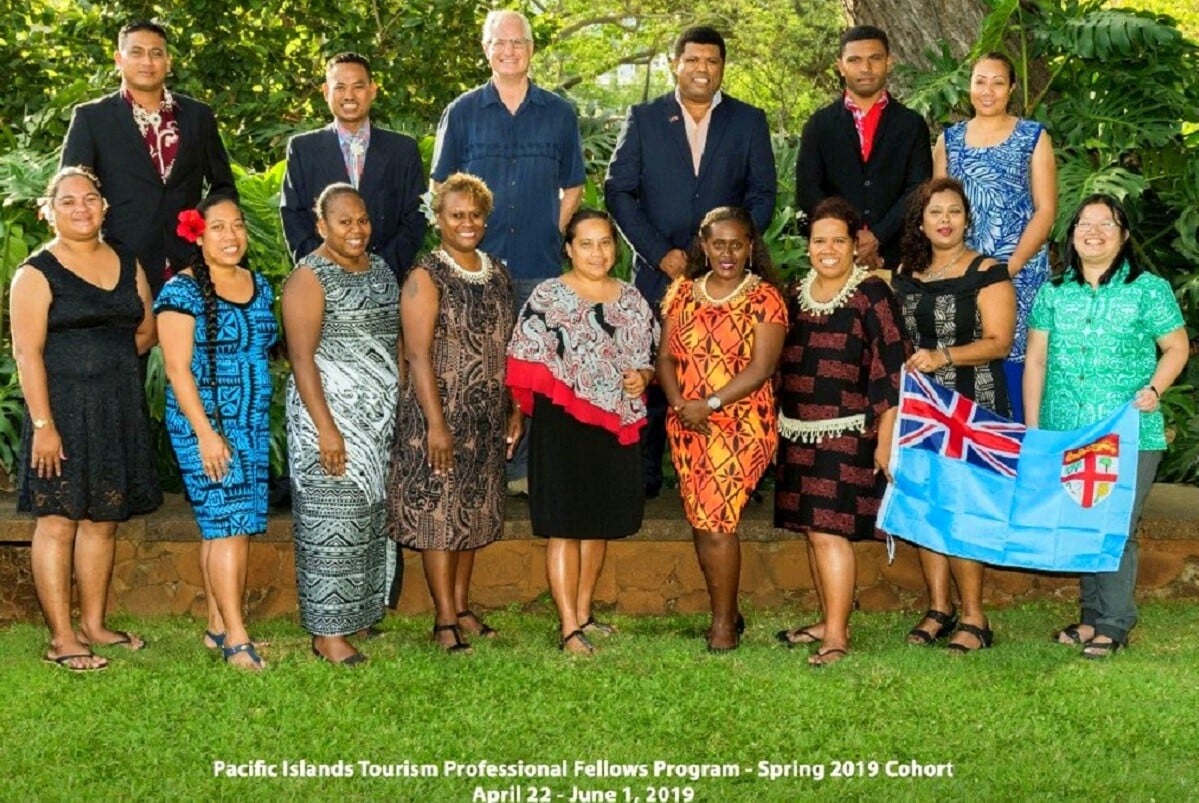APTC Students display high standard of service at 45th Pacific Island Forum
The small island state of Palau was abuzz last week as more than 300 delegates arrived to attend the 45th Pacific Islands Forum (PIF). This year’s theme was The Ocean: Life and Future chosen by the host Government of Palau. The theme was appropriately chosen as Palau is the first country in the world to declare its waters a sanctuary for sharks. It was also significant, in light of the potential benefits that an effectively managed ocean would have on tourism not only for Palau but for many other Small Island States (SIS) and other developing countries across the Pacific.
Chairman of the PIF and Palau’s President, Tommy Remengasau Junior acknowledged the significance of both the Tourism Industry and its relevance to the theme. According to President Remengasau, “the Tourism Industry, which is our bread and butter, is the mother goose that lays the golden egg for us”. He then went on to say that, “the idea of Palau doing the marine sanctuary is for tourism, for food security and for the region”. The theme around Oceans and the North Pacific’s strategic position to shape dialogue around conservation, climate change and food security is significant in the lead up to the Third United Nations Conference on Small Island Developing States to be held in Samoa in September this year.
There are currently 14 students enrolled in the Australia-Pacific Technical College (APTC)’s Certificate III in Hospitality, delivered at the Palau Community College in Koror. Under the tutelage of APTC Hospitality Trainer, William Hetherington, these students were given the opportunity to provide exclusive catering services for one of the significant events on the forum’s program, the Small Islands States (SIS) Leaders’ Meeting, for leaders from the Pacific’s 7 SIS nations – Tuvalu, Republic of the Marshall Islands, Kiribati, Palau, Cook Islands, Nauru and Niue.
According to William, “the opportunity really came to cater exclusively when the Palau Community College meeting hall next to the training restaurant and kitchen became a venue for the Small Island States Leaders’ Meeting”. For many of William’s students, this was particularly significant given Palau’s size and location and the lack of opportunities to showcase the high standard of training they receive as part of their APTC program.
APTC is a development initiative funded by the Australian Government to deliver training and to increase the supply of skilled workers in targeted sectors in the Pacific region. APTC has campuses in Fiji, Samoa, Vanuatu, Papua New Guinea and Solomon Islands.
William also reiterates President Remengasau’s sentiments regarding the significance of the tourism sector for both Palau and its neighbouring island states. “There is a definite need for hospitality and tourism training in the region. I think the students who will graduate are taking really practical and cohesive skills into a small community. This has a fanning out effect. There are already APTC graduates employed at the Palau Pacific Resort, and these individuals help to benchmark a level of industry standard service”. William goes on to say that “Palau is at a turning point with its tourism market. With the potential to move into higher end markets, it is going to need workers capable of delivering the higher service expectation in all areas of hospitality/cookery/tourism”.
Other events which were part of last week’s PIF program, which gave both APTC students and APTC Alumni, employed by the Palau Pacific Resort, an opportunity to showcase the high standard of training they received at APTC were the Official Opening of the 45th PIF and the State Dinner hosted by Palau’s President and First Lady. In addition, students also gained practical work experience, working for the Palau Pacific Resort in front of house, food and beverage service.
The high quality of service delivery and the quality of the food served during the first day of the PIF were noted by various delegates. William speaks of his encounter with two international academics who had presented at the forum, saying they “shook my hand in the coffee shop and commented on the service levels of the students”.
PIFS Communications Officer, Mereseini Tuivuniwai, who also attended the Forum, confirmed that many delegates including SIS leaders had remarked on the great food and preparation by the students at the SIS Leaders’ Meeting. Mereseini also noted that for the opening ceremony, “the food was just fantastic and so too was the whole ceremony and set up”.
Besides climate change and greater development cooperation, exercise and healthy eating are also items that were part of last week’s agenda. Palau’s Program Manager for Non Communicable Diseases (NCDs), Edolem Ikderdeu confirmed in an interview with ABC’s Radio Australia last week, that “we also recommended healthy eating, so we put out dietary guidelines for Palau to all vendors responsible for preparing the food for all the meetings [at the PIF], including the use of environmentally-friendly products”.
William acknowledges the importance of this effort to encourage healthy eating in the Pacific region where NCDs such as diabetes and high blood pressure account for about 75 percent of deaths. He noted that “the style of our menus – lighter healthier dishes – worked well within the PIF’s guidelines for healthier eating”.
You May Also Like
These Related Stories
Palau graduation celebrates achievements of APTC graduates
